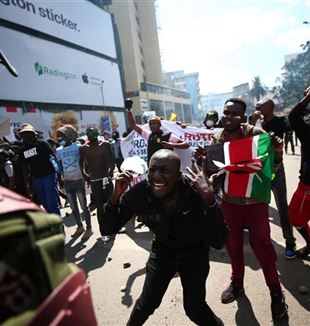
Kenya: The greatest revolution
The youth protests and violence last June, a provocation that has raised many questions and a common judgement, in a flyer signed by the CL university students in Kenya.The violent youth protests that broke out in mid-June in Kenya have been suppressed. Such clashes are unprecedented in a country still pervaded by hostilities between tribes, ethnicities and social classes, but which has not seen demonstrations like these, let alone violent repression. According to the authorities, 50 people lost their lives in the squares, some of them classified in morgues as “traffic accident victims.” “These were sudden demonstrations, well-coordinated on social media, which took everyone by surprise, starting with the government,” says Peter Mathenge, the CL responsible in Kenya, whom we met at the Assembly of International Responsibles in La Thuile along with Silvio Kaliunga and Pascal Ouma. The target of the struggles were endemic corruption and tax increases. “Even though the demonstrations were suppressed rather quickly,” Peter added, ”they caused a lot of concern, first of all to me, but also to our community. There were two incidents in particular that made me realize how disconnected I was from reality and from the needs of young people.”
The first incident happened in Nairobi Cathedral, where the bishops had invited young people from ‘Generation Z’ to a Mass. At one point, the celebrant asked those present a question that was meant to be rhetorical: “Do you think the Church has neglected young people?” Surprisingly, the response was unanimous and strong: “Yes!” The second event touched Peter directly: “A few days after the protests began, my teenage daughter told me that she, like others in Gen Z, was also fighting for justice and for her rights to be respected.” The riots were no longer just something that was seen on television or in the streets. The demonstrations had entered the Mathenge household. Reality posed a challenge that could not be ignored, even after President William Ruto withdrew the highly contested budget bill. The unease was deeper: Gen Z rejects authority. Families, the Church, institutions.
“We had to enter into dialogue with these demands. And in this, we have to thank Davide Prosperi for the intervention Culture: Being for Christ. Although it is a difficult text, it helped us to judge the situation. Friends reminded me that the greatest revolution happened and happens with the resurrection of Christ.” Pascal, who leads a School of Community group with many young people, deepened the judgment with CL university students, some of whom had taken to the streets alongside their companions. Out of this work came a document, titled “The True Revolution” and signed “CLU Kenya.” “The first idea was to involve a number of economic experts,” Pascal said, ”but we were challenged to look at the issues from the perspective of our own experience, from what we are.” Thus, rather than answers, many questions emerged. “Corruption and the misuse of public resources are widespread,” Silvio explained, “and inflation and tax increases do not benefit the population. Salaries are often not enough to cover the needs of families. The demand for a decent life is right. But it does not justify hatred and anger.”
“As students and citizens of this country, we feel the need to make our voices heard,” thus reads the flyer that the university students circulated among friends in late July: ”We want to follow in the footsteps of our bishops, who have loudly supported the protests and issued statements that help us better understand this deep cry.” Indeed, in a statement in late June, the Kenya Bishops' Conference recognized Gen Z's aspirations as “valid”: “We have admired the unity beyond tribe and social class, which is a sign of true care and love. This should increase your commitment to good causes.” The CLU flyer reminds us, however, that “true freedom can only be achieved by supporting each other toward the common good”: “We do not want indignation and revenge to be the motive for our decisions,” because that would make vain the “collective desire to belong and live in a more just society,” to “be responsible for our choices” to fight corruption. “When we are overcome with anger, we become blind to the truth and are tempted to take revenge for any injustice. We are tempted to say that evil, corruption and selfishness are only in others, but we are aware that they are in us too. To live a just life, we recognize that the right battle to fight is to resist corruption and selfishness in our hearts, realizing that this could be the beginning of a new world.”
Read also - Egypt: Ties that transform
The flyer also goes so far as to judge the idea of authority prevalent in Gen Z. “Some think that politicians, parents and church leaders should be blamed, that our freedom is threatened by any authority or membership. We oppose this idea because it does not correspond to our daily Christian experience. Freedom is experienced when our deepest cry for happiness, justice, love and beauty is satisfied in our daily lives, and this is only possible by following someone who is already on the path to fulfillment. We know that no human authority is perfect, but we have experienced true fulfillment only in a community guided towards good. That is why we share the aspirations of young people to be free and to live in a country without corruption, but we reject anger, revenge and hatred in any form. We want justice, love, happiness and truth, and we believe that the only way to achieve them is to follow the absolute good we have found in Christ and the Church. This is the only true revolution.”